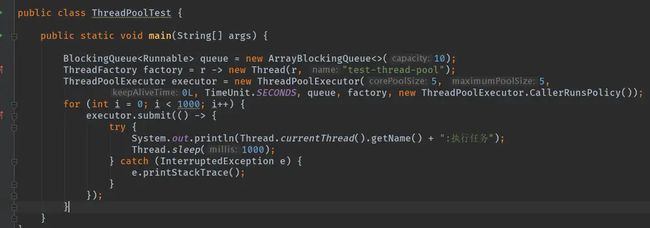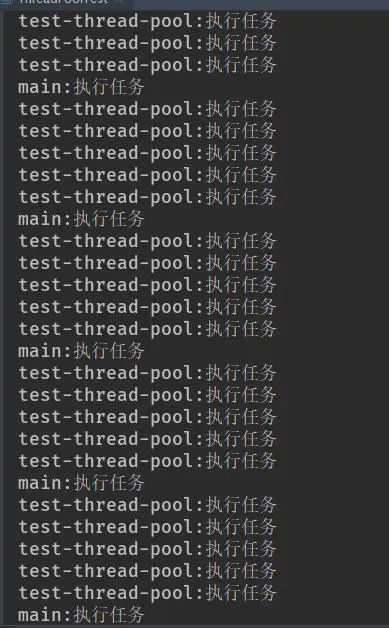如何使用Java线程池的拒绝策略
一、线程池核心参数
ThreadPoolExecutor最核心的构造方法 : ![]()
![]()
二、线程增长过程
![]()
三、线程池拒绝策略
拒绝策略RejectedExecutionHandler做一下详细的工作:在使用线程池并且使用有界队列的时候,如果队列满了,任务添加到线程池的时候就会有问题,针对这些问题java线程池提供了以下几种策略:
(1)AbortPolicy
(2)DiscardPolicy
(3)DiscardOldestPolicy
(4)CallerRunsPolicy
(5)自定义 ![]()
四、拒绝策略场景分析
AbortPolicy
ThreadPoolExecutor.AbortPolicy:丢弃任务并抛出RejectedExecutionException异常。
A handler for rejected tasks that throws a {@code RejectedExecutionException}.
这是线程池默认的拒绝策略,在任务不能再提交的时候,抛出异常,及时反馈程序运行状态。如果是比较关键的业务,推荐使用此拒绝策略,这样子在系统不能承载更大的并发量的时候,能够及时的通过异常发现。
DiscardPolicy
ThreadPoolExecutor.DiscardPolicy:丢弃任务,但是不抛出异常。如果线程队列已满,则后续提交的任务都会被丢弃,且是静默丢弃。
A handler for rejected tasks that silently discards therejected task.
使用此策略,可能会使我们无法发现系统的异常状态。建议是一些无关紧要的业务采用此策略。例如,本人的博客网站统计阅读量就是采用的这种拒绝策略。
DiscardOldestPolicy
ThreadPoolExecutor.DiscardOldestPolicy:丢弃队列最前面的任务,然后重新提交被拒绝的任务。
A handler for rejected tasks that discards the oldest unhandled request and then retries {@code execute}, unless the executor is shut down, in which case the task is discarded.
此拒绝策略,是一种喜新厌旧的拒绝策略。是否要采用此种拒绝策略,还得根据实际业务是否允许丢弃老任务来认真衡量。
CallerRunsPolicy
ThreadPoolExecutor.CallerRunsPolicy:由调用线程处理该任务
A handler for rejected tasks that runs the rejected task directly in the calling thread of the {@code execute} method, unless the executor has been shut down, in which case the task is discarded.
如果任务被拒绝了,则由调用线程(提交任务的线程)直接执行此任务,我们可以通过代码来验证这一点:
把之前的代码修改如下:
public static void main(String[] args) {
BlockingQueue queue = new ArrayBlockingQueue<>(10);
ThreadFactory factory = r -> new Thread(r, "test-thread-pool");
ThreadPoolExecutor executor = new ThreadPoolExecutor(5, 5,
0L, TimeUnit.SECONDS, queue, factory, new ThreadPoolExecutor.CallerRunsPolicy());
for (int i = 0; i < 1000; i++) {
executor.submit(() -> {
try {
System.out.println(Thread.currentThread().getName() + ":执行任务");
Thread.sleep(1000);
} catch (InterruptedException e) {
e.printStackTrace();
}
});
}
}
image
把队列最大值改为10,打印输出线程的名称。执行结果如下:
image
通过结果可以看到,主线程main也执行了任务,这正说明了此拒绝策略由调用线程(提交任务的线程)直接执行被丢弃的任务的。

